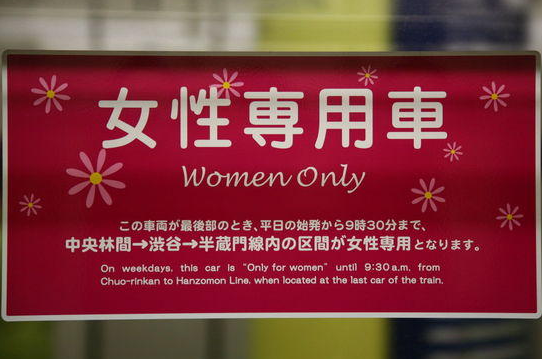Safe Spaces & The Internet Nerd
I work at a pretty traditional company, among a mix of blue- and white-collar employees. Most conversations around here focus on cars, reality TV and sports. I’m definitely the weird one, as someone whose interests are primarily nerdy. Granted, since Game of Thrones became so popular, I have a lot more to talk about (and a lot of PLEASE TELL ME WHAT HAPPENS NEXT emails to ignore), but generally, I self-censor as to not spend 3 hours excitedly talking about my tabletop RPG campaign, the new Sailor Moon anime and how badly I want to switch my keyboard to DVORAK instead of QWERTY.
I’m certainly not the only nerd in this situation, but I am lucky enough to live in a time when the internet is a massive melting pot for me to find other people who love the same nerdy, geeky, fan-ish stuff I love. But even in the huge space of the internet, I’m still not part of the majority of nerds, because I’m a woman.
One of the beauties of the internet, though, is that it’s a little easier to find a space where I can talk to other lady nerds, where we can filter our love of fandom through our experiences without bringing with it all of the baggage of being different from the majority. On the internet, a shield of anonymity brings with it a lot of hate and ignorance, so a space that’s safe and separate from that bigotry can be amazing.
If you are in the majority, which in internet geekdom translates to “straight white American male,” you might not understand what a “safe space” is and why they’re necessary. You might not get what the fuss is about, because you’ve never needed a safe space. For you, the internet is your safe space.
Most of our culture is created for and marketed to men. Spaces generally default to a male perspective, especially nerdy spaces, where all too frequently women are treated as an outlier, an exception in the geek demographic. Despite the fact that in areas like digital gaming, women have increased to a 48% share of the demographic (up 3% in only a year!) or that 46.67% of comic book readers are female, women in nerdy spaces are treated as an exception to the rule.
You don’t have to look much further than the internet age old-adage “there are no women on the internet” to demonstrate the mindset popular in online communities.
What It’s Like
To understand why a space is needed, any dude has to understand what it’s like being a woman in nerdom. Imagine that every time you posted, commented, or just said something, your content was scrutinized not based on what you express, but based off of your hair color. Your hair color doesn’t determine anything about you, it’s just what color your hair is. Yet, you’re treated like your hair color entirely informs what you have to say, or what you have to say is ignored in favor of comments about your hair color! Your hair color means that you need to be more scrutinized than anybody else, weighed and judged because since you’ve got brown hair, maybe you aren’t really a nerd.
Substitute ‘gender’ for hair color and pretty soon you start to get the idea of what it’s like, and how frustrating it can be to be a woman in nerd spaces. Of course, the analogy doesn’t even touch the more extreme yet very common aspects of being female in a male-dominated space: constant sexual suggestions, stalking and harassment, rape threats. If you’re a dude on the internet, you’ve likely never gotten seriously threatened with rape from a person who, given the chance, would probably follow through.
What’s a Safe Space?
A “safe space” is generally a centric area where people who are not the majority can escape this kind of scrutiny and negativity. It’s a space dedicated for those that share something not in the majority (e.g. sexual preference, gender identity, skin color, etc). It’s a place to talk about issues relevant and understood by this group that otherwise gets drowned out in the majority viewpoint (to borrow a term from reddit, I like referring to this viewpoint as the “hivemind”). Sometimes it’s not always about discussing issues centric to the orientation of the space, sometimes it’s just about having a space to talk about what the hell ever with people who share your experience.
I’m a pretty prolific redditor, and I subscribe to quite a few subreddits designed to be safe spaces for women. These are some really awesome communities where I can discuss women’s stuff that I’d never feel comfortable discussing in a non-oriented sub. And by “women’s stuff,” I mean everything from “dudes need to stop telling me to smile when I’m walking down the street” to “period shits.”
If I talked about this sort of thing on a general sub, it’s very likely the whole conversation would get transformed. A lot of the time, as soon as a woman puts something out in a very public space, the conversation shifts focus from the topic she’s discussing, to the woman making the comments.
What About Inclusiveness?
One of the arguments in favor of the recent merger of The Mary Sue and Geekosystem was the idea of ‘inclusiveness,’ the idea of a space for everybody, not just women. Personally, I don’t buy the idea that TMS wasn’t previously inclusive, and some of the controversial statements by Geekosystem/TMS associate editor Glen Tickle actually support this, though I doubt that was the intention.
“Did you know that last month 55% of The Mary Sue readers were male?” was Tickle’s quote, from the Reddit AMA of the merged Geekosystem/TMS crew. While I definitely question this unsourced statistic (which I guess was either gathered by comment observation or actually somehow gathered by market research that we haven’t seen), if true, it does demonstrate that TMS already was inclusive, because “safe space” is not antithetical to “inclusiveness.”
Let me repeat that, because it’s an important one: “Safe space” is not antithetical to “inclusiveness.”
A great example of inclusiveness is my favorite subreddit, r/TrollXChromosomes. TrollX is about women supporting one another through camaraderie, shared experiences, and above all, humor. It’s a great sub and actually has a pretty substantial amount of male subscribers, who help form what is a really positive, fun community.
The male subscribers from TrollX are never excluded because they are male, but they are excluded (by downvotes or banning), if they don’t participate in a way that preserves what makes TrollX a safe space. The impetus of inclusiveness of a safe space isn’t on the safe space itself to provide, but for those who participate in the space.
It’s all about context and participation. There’s a huge breadth between participating in a safe space and invading. If you try to impose your contextual viewpoint in a space that’s not designed for you? That’s not participation. That’s doing the exact opposite of what a safe space is designed for. When you have a conversation, when you’re supportive, when you adapt to the tone and content of the space, that’s when you begin to participate.
The new “inclusiveness” espoused by the Geekosystem/TMS merger isn’t really inclusiveness. It comes off as a corporate buzzword and it misses the point of what inclusiveness in a safe space is. By removing all aspects of the woman-oriented conversation (getting rid of the tagline “A Guide to Geek Girl Culture,” very specifically deemphasizing feminism in the Message from the Editors, minimizing the iconic and awesome logos, among other things), The Mary Sue isn’t becoming more inclusive. It’s just removing the aspects that made it a safe space for women. This merger makes it just like the majority of other nerdy blogs on the web: a place for men.
TMS was already inclusive, and Tickler, maybe not realizing it, already argued for that fact by talking up how much of a woman-centric space safe was made up of male participants. There wasn’t a problem with inclusiveness before the merger, and playing up the idea of The Mary Sue being more inclusive by removing its power as “A Guide to Geek Girl Culture” is downright offensive.
It’s Not Just Women, Either
I use recent events impacting womens’ safe spaces because I’m a woman and they’re spaces that I care about. I identify with the situation and scenarios, and I utilize these spaces. But it’s important to remember that what I’m saying applies to any safe space, any place where those with less voices don’t get drowned out by the loud majority. Safe spaces can be for women, for people of color, for LGBTQ folks, for any minority.
The point of any safe space is the same, though the content may vary. The idea of participating through valuing and respecting the experience of the minority remains. If, of course, you’re invited. While a safe space is not antithetical to inclusiveness, they are not one in the same.
We All Want to Have the Same Fun
It’s not easy to empathize with a situation that you don’t personally experience, especially as something as complicated as the issues minorities of any type experience on a regular basis. These experiences are part of our lives; they shape who we are in a massive way. Sometimes that’s great: I like being a woman! But sometimes it’s also not fair and it sucks: I don’t like feeling shitty about myself because other people have been saying I should my whole life.
As a member of the majority, you can’t lose sight of the fact that a gay nerd or a woman nerd or a hispanic nerd is still a nerd. We all want to have the same fun. We all want to enjoy the same things. We all deserve to enjoy what we love, we all deserve to be equal parts of a fandom that defies demographics. That’s why we have safe spaces: we deserve a place we can enjoy what we love for the sheer fun of it without being talked over because we’re different. Remembering, understanding and respecting that is the first step in changing things for the better.






